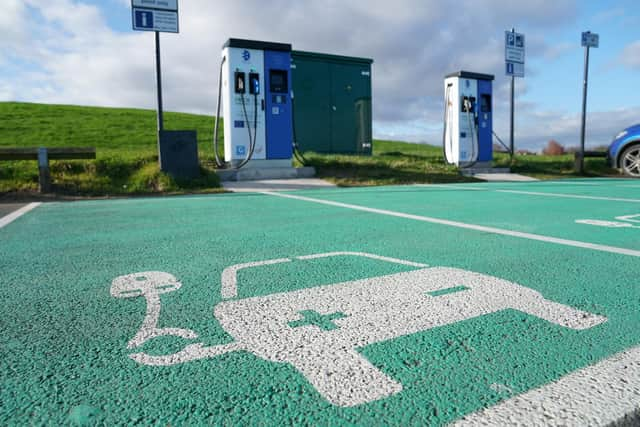Number of Harrogate electric vehicle charging points rises over last two years
and live on Freeview channel 276
As people are urged to "invest in our planet" for Earth Day 2022, the Government is aiming to entirely phase out petrol and diesel-powered cars by 2030.
But with battery electric vehicles planned to account for all car sales by 2035, it has faced criticism from the Society of Motor Manufacturers and Traders, which says there are not enough charging points for many people to purchase electric vehicles.
Advertisement
Hide AdAdvertisement
Hide AdDepartment for Transport figures show there were 56 publicly provided charging points in Harrogate on January 1 – up from 36 two years ago.


They were among 28,375 installed across the UK at the start of this year, up from 16,505 in January 2020.
Harrogate residents had also installed 1,071 at-home charging points through the Electric Vehicle Homecharge Scheme as of January 1 – a 200% increase over the last two years, further Department for Transport figures outline.
The scheme gives applicants a 75% grant towards the cost of installing the charging point up to £350.
Advertisement
Hide AdAdvertisement
Hide AdThere have also been 89 charging points installed at workplaces.
But with residents requiring "designated, private off-street parking" for the Homecharge Scheme, the SMMT has argued for more investment for those who only have on-street parking available.
Across Yorkshire and The Humber, only 25 charging points have been fitted as a part of the On-Street Residential Scheme, to which local authorities can apply to fund installations.
A further 72 applications have been approved since April 2019, but installation remains incomplete.
Advertisement
Hide AdAdvertisement
Hide AdOn April 22, events are taking place around the world for Earth Day 2022, with a focus on encouraging businesses, including in the motoring sector, to invest in sustainable products and enterprises.
Separate figures from the SMMT show there are now more than 460,000 battery-electric cars in the UK, more than double the number two years before.
On average, an electric car will emit around one-third less carbon dioxide than an equivalent petrol or diesel car, Transport & Environment, a European clean transport campaign group, says.
But a lack of charging points is putting people off from switching, SMMT chief executive Mike Hawes argues.
Advertisement
Hide AdAdvertisement
Hide Ad"The automotive industry is up for the challenge of a zero-emission new car and van market by 2035", said Mr Hawes.
"Delivering this ambition needs more than automotive investment; it needs the commensurate commitment of all other stakeholders, especially the charging industry."
The Government announced major investment plans in charging infrastructure last month, totalling £1.6 billion across a range of schemes.
They include the already announced £950 million Rapid Charging Fund, to install more than 6,000 rapid chargers on England's motorways, and a £450 million Local Electric Vehicle Infrastructure fund to address the shortfall of local charging points.
By 2030, the Government aims to provide 300,000 public charging points, 18 times the number a decade previously.
